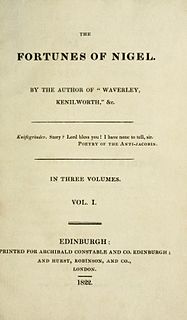 W
WThe Dark Frigate is a 1923 children's historical novel written by Charles Hawes. It won the 1924 Newbery Medal. It was the third, and final, novel written by Hawes, who died shortly before its publication.
 W
WForged in the Fire is a 2006 novel for young adults by Ann Turnbull, about Quaker life in the 1660s. It is the sequel to No Shame, No Fear, published in 2003.
 W
WThe Fortunes of Nigel (1822) is one of the Waverley novels by Sir Walter Scott. Set in London in either 1623 or 1624, it centres on the Scottish community there after the Union of the Crowns and features James VI and I.
 W
WThe Great House is a children's historical novel by Cynthia Harnett. It was first published in 1949 with illustrations by the author.
 W
WI, Coriander is a children's novel by Sally Gardner, published in 2005, a historical fantasy set in London at the time of the Puritan Commonwealth. The novel traces the time period of the beheading of Charles the 1st through the Restoration of Charles the 2nd. It won the Nestlé Children's Book Prize Gold Award. It was also shortlisted for the British Children's Book of the Year and the Stockton Children's Book of the Year, as well as longlisted for the Carnegie Medal.
 W
WLorna Doone: A Romance of Exmoor is a novel by English author Richard Doddridge Blackmore, published in 1869. It is a romance based on a group of historical characters and set in the late 17th century in Devon and Somerset, particularly around the East Lyn Valley area of Exmoor. In 2003, the novel was listed on the BBC's survey The Big Read.
 W
WMy Name is Not Angelica is a 1989 young adult novel by Scott O’Dell. This historical fiction takes place during the 1733 slave insurrection on St. John Island, then a colony of Denmark.
 W
WNo Shame, No Fear is a 2003 novel for young adults by Ann Turnbull. Set in the fictional town of Hemsbury in the 1660s, the novel depicts the love between a Quaker girl, Susanna, and Will, the son of a rich merchant. Their story takes place during the persecution of religious dissenters after the restoration of the monarchy.
 W
WQuicksilver is a historical novel by Neal Stephenson, published in 2003. It is the first volume of The Baroque Cycle, his late Baroque historical fiction series, succeeded by The Confusion and The System of the World. Quicksilver won the Arthur C. Clarke Award and was nominated for the Locus Award in 2004. Stephenson organized the structure of Quicksilver such that chapters have been incorporated into three internal books titled "Quicksilver", "The King of the Vagabonds", and "Odalisque". In 2006, each internal book was released in separate paperback editions, to make the 900 pages more approachable for readers. These internal books were originally independent novels within the greater cycle during composition.